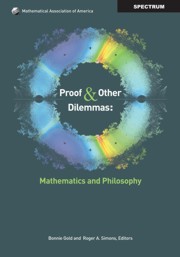Book contents
- Frontmatter
- Contents
- Acknowledgments
- Introduction
- I Proof and How it is Changing
- 1 Proof: Its Nature and Significance
- 2 Implications of Experimental Mathematics for the Philosophy of Mathematics
- 3 On the Roles of Proof in Mathematics
- II Social Constructivist Views of Mathematics
- III The Nature of Mathematical Objects and Mathematical Knowledge
- IV The Nature of Mathematics and its Applications
- Glossary of Common Philosophical Terms
- About the Editors
2 - Implications of Experimental Mathematics for the Philosophy of Mathematics
from I - Proof and How it is Changing
- Frontmatter
- Contents
- Acknowledgments
- Introduction
- I Proof and How it is Changing
- 1 Proof: Its Nature and Significance
- 2 Implications of Experimental Mathematics for the Philosophy of Mathematics
- 3 On the Roles of Proof in Mathematics
- II Social Constructivist Views of Mathematics
- III The Nature of Mathematical Objects and Mathematical Knowledge
- IV The Nature of Mathematics and its Applications
- Glossary of Common Philosophical Terms
- About the Editors
Summary
From the Editors
When computers were first introduced, they were much more a tool for the other sciences than for mathematics. It was many years before more than a very small subset of mathematicians used them for anything beyond word-processing. Today, however, more and more mathematicians are using computers to actively assist their mathematical research in a range of ways. In this chapter, Jonathan Borwein, one of the leaders in this trend, discusses ways that computers can be used in the development of mathematics, both to assist in the discovery of mathematical facts and to assist in the development of their proofs. He suggests that what mathematics requires is secure knowledge that mathematical claims are true, and an understanding of why they are true, and that proofs are not necessarily the only route to this security. For teachers of mathematics, computers are a very helpful, if not essential, component of a constructivist approach to the mathematics curriculum.
Jonathan Borwein holds a Canada Research Chair in the Faculty of Computer Science at Dalhousie University (users.cs.dal.ca/ jborwein/). His research interests include scientific computation, numerical optimization, image reconstruction, computational number theory, experimental mathematics, and collaborative technology. He was the founding Director of the Centre for Experimental and Constructive Mathematics, a Simon Fraser University research center within the Departments of Mathematics and Statistics and Actuarial Science, established in 1993.
- Type
- Chapter
- Information
- Proof and Other DilemmasMathematics and Philosophy, pp. 33 - 60Publisher: Mathematical Association of AmericaPrint publication year: 2008



